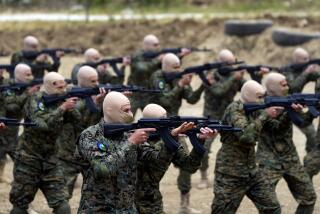Palestinian Terrorists Are Sabotage Suspects : U.S. Experts Point to Abu Nidal or Abu Moussa as Possible Chief Plotters
- Share via
NICOSIA, Cyprus — Terrorism experts seeking the author of the suspected sabotage of a Pan American World Airways jumbo jet en route from London to New York have few clues, but they are focusing their initial suspicion on several key Palestinian terrorists.
“There is a lot of investigating going on but . . . we don’t know for sure what the cause is,” State Department spokeswoman Phyllis Oakley said in Washington. “We can’t make definitive evaluations in any sense about what the crash was, who did it, what happened.”
Within hours of the crash, both Iranian Prime Minister Hussein Moussavi and Mahmoud Abbas, a member of the Executive Committee of the Palestine Liberation Organization, issued vehement denials of involvement in the crash.
In London, a caller identifying himself as a spokesman for a group called the “Guardians of the Islamic Revolution,” an organization believed to have ties to Lebanon and Iran, claimed Thursday that his group brought down the Pan Am jet. He said the plane was bombed in retaliation for the U.S. Navy missile attack that downed a civilian Iranian jetliner over the Persian Gulf on July 3. The Pentagon said the airliner was mistaken for an approaching warplane.
Earlier this month, a man speaking in what was described as a Middle East accent called the U.S. Embassy in Helsinki and said a bomb would be placed aboard a Pan Am plane by the terrorist group headed by Abu Nidal, whose real name is Sabri Banna.
Most terrorism experts said Abu Nidal’s organization, called Fatah Revolutionary Council, is more likely to have caused such an act than the Guardians of the Islamic Revolution, although they conceded that a third group could also have been responsible.
Terrell Arnold, a U.S. terrorism expert, said the threat to the embassy in Helsinki was less consistent with Abu Nidal’s mode of operation than with that of Abu Moussa, another renegade Palestinian terrorist. “But it is also an easy thing to copy,” Arnold said.
A U.S. terrorism expert who asked not to be identified said the Guardians of the Islamic Revolution had attacked Iranian dissidents in Western Europe. “But their previous attacks have been pretty amateurish,” he said, “and that gives some doubt to the credibility of their claim.”
Also, he noted, “they didn’t claim it until this morning, and the time lag, I would suggest, doesn’t improve their credibility.”
Oakley also noted that the telephone call in the name of the Guardians of the Islamic Revolution “was made several hours after the public announcement of the crash, (so) there is simply no way that we can verify this claim.”
Neil Livingstone, another U.S. terrorism authority, also was skeptical of claims of responsibility. “The media were all but inviting someone to take responsibility for this,” he said. “If I had been a sleaze bag from some Iranian student organization, I might have claimed responsibility too.”
He suggested that Islamic Jihad (Islamic Holy War), a terrorist group that claims to hold some of the American hostages in Lebanon, might have claimed responsibility through the Guardians of the Islamic Revolution in a pattern consistent with past use of one-time-only aliases.
Livingstone also expressed doubt that Abu Nidal was involved. If the Pan Am jet was sabotaged, he said, that “was not one of Abu Nidal’s modus operandi . He has traditionally attacked people in airports.”
By contrast, Livingstone said, Abu Moussa’s organization has been involved “in a number of bombings in aviation targets over the years.” The group enjoys substantial Syrian support, he said.
Livingstone suggested that another possible sponsor might be supporters of the Hamadi brothers, a pair of Lebanese who are now imprisoned in West Germany for terrorist acts against Americans and Europeans. They have been known to use sophisticated liquid explosives.
Diplomats in the Middle East said attention was focused on Palestinian groups even before the Pan Am crash, in the wake of the State Department’s decision last week to begin a dialogue with the PLO. The decision to end the 13-year ban on talks with the PLO was based in large measure on assurances by PLO leader Yasser Arafat that the group had renounced terrorism.
A coalition of renegade Palestinian groups opposed to Arafat and based in Damascus, Syria, said Tuesday that they were planning ways to undermine “Arafat’s surrenderist moves.” News agency accounts from the Syrian capital said that the coalition vowed to oust Arafat and install a new PLO leadership that would “sponsor the armed struggle against Israel as the only way to liberate the occupied territories.”
Expelled From Syria
Abu Nidal and his Fatah Revolutionary Council have been expelled from Syria, and the group now works out of the slums of Beirut as well as southern and eastern Lebanon and the Libyan capital of Tripoli.
When Arafat was last on the verge of a major peace move in late 1985, Abu Nidal’s guerrillas attacked ticket counters belonging to TWA and the Israeli airline El Al at the Vienna and Rome airports. Twenty people were killed, including five Americans and four of the terrorists.
Western experts on Iran tended to support the Iranian government’s denial of responsibility in the Pan Am crash. They noted that the Tehran government has recently embarked on a quiet policy of improving its relations with the West aimed in part at shedding Iran’s image as nation animated solely by radical fundamentalism.
Wallace reported from Nicosia, Cyprus, and Jehl from Washington.
More to Read
Sign up for Essential California
The most important California stories and recommendations in your inbox every morning.
You may occasionally receive promotional content from the Los Angeles Times.













